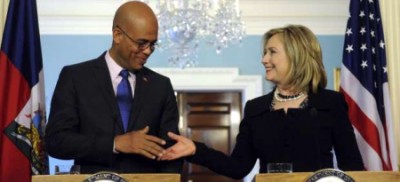How the “International Community” Rigged the 2010 Elections in Haiti
Head of OAS Electoral Mission in Haiti Confirms the International Community Tried to Remove Préval on Election Day

Speaking in early May at the “Who ‘Owns’ Haiti?” symposium at George Washington’s Elliot School of International Affairs, Colin Granderson, the head of the CARICOM-OAS Electoral Mission in Haiti in 2010-2011 confirmed previous accounts that the international community tried to force then-president Réné Préval from power on election day.
That the international community had “offered” President Préval a plane out of the country during Haiti’s chaotic first-round election in November 2010 was firstrevealed by Ricardo Seitenfus, the former OAS Special Representative to Haiti. Seitenfus subsequently lost his position with the OAS, but Préval himself soon confirmed the story, telling author Amy Wilentz:
“At around noon, they called me,” he said in an interview at the palace recently. “‘It’s no longer an election,’ they told me. ‘It’s a political problem. Do you want a plane to leave?’ I don’t know how they were going to explain my departure, but I got rid of that problem for them by refusing to go. I want to serve out my mandate and give the presidency over to an elected president.”
Despite accounts of the story from three different high-level sources who were there, the story has gained little international traction in the media.
In filmmaker Raoul Peck’s documentary “Fatal Assistance,” Préval revealed that it was the head of the U.N. mission in Haiti at the time, Edmond Mulet, who made the threat. (Seitenfus recently offered his recollection of discussions with Mulet and other high-level officials that day in an exclusive interview with CEPR and freelance Georgianne Nienaber.) For his part, Mulet categorically denied the event, telling Catherine Porter of the Toronto Star:
“I never said that, he never answered that,” Mulet told the Star when asked about Préval’s allegation. “I was worried if he didn’t stop the fraud and rioting, a revolution would force him to leave. I didn’t have the capability, the power or the interest of putting him on a plane.”
The election, plagued by record-low turnout, problems with voter registration andmassive irregularities, was in doubt on election day when, around noon, 12 of 18 presidential candidates held a press conference calling for the election to be cancelled. Speaking at last month’s symposium, Granderson discussed what happened next (just past the 11 minute mark in this video):
The international community intervened, working with representatives of the private sector, and managed to get two of the candidates to reverse themselves, to renege on their commitment, and this rescued the electoral process.
But what I think was most unsettling, was that following this attempt to have these elections cancelled, was the intervention of certain members of the international community basically calling on President Préval to step down.
This wouldn’t be the end of the international community’s intervention in the electoral process. After first-round results were announced showing Mirlande Manigat and Préval’s successor Jude Célestin moving on to the second round, a team from the OAS was brought in to analyze the results. Despite having no statistical evidence, and instead of cancelling the elections, the OAS team overturned the first round results, replacing Célestin in the second round with Michel Martelly. Seitenfus has described in detail how this intervention was carried out, in his recent interviewwith CEPR and in his forthcoming book, International Crossroads and Failures in Haiti.

